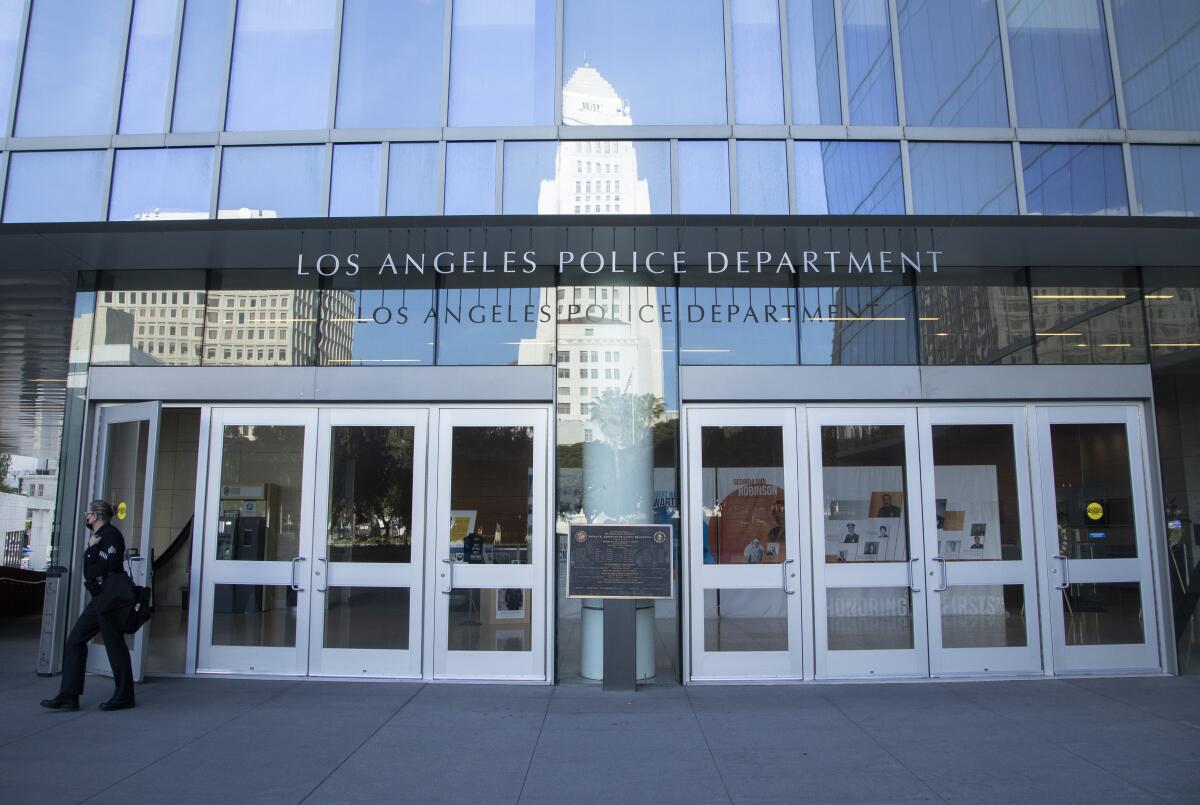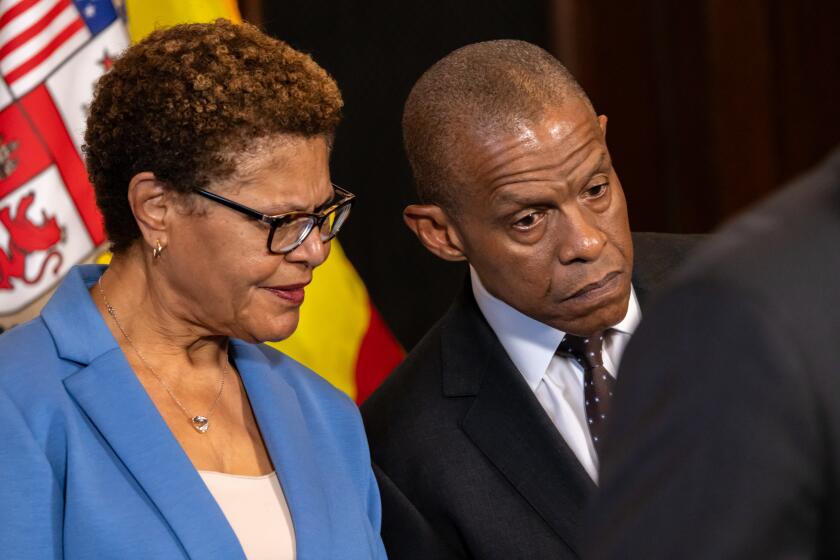LAPD gang officers under investigation for actions in traffic stops, sources say

- Share via
Several members of an LAPD gang unit that is often responsible for serving warrants on suspected criminals recently found themselves on the other side of the equation — as subjects of search warrants that allowed the department’s internal affairs investigators to take the rare step of inspecting their lockers.
The precise nature of the allegations against officers remains unclear, but, according to multiple sources who requested anonymity because they are not authorized to speak publicly about the ongoing investigation, some of those targeted by the search warrants were found to have routinely switched off their body cameras during traffic stops.
The locker searches, which one senior police official described as a once-in-a-decade occurrence, sent a shudder through the department’s ranks as rumors spread of an investigation that has put an unknown number of officers under scrutiny. The case remains shrouded in secrecy, and tight-lipped LAPD officials would only confirm that the searches occurred last Thursday at the Mission Division in the San Fernando Valley.
Internal affairs detectives showed up at the station to serve the warrants and peek inside the officers’ lockers, according to two sources. It was not immediately clear what they were looking for or what, if anything, they took.
An LAPD spokesperson confirmed that the department has launched an internal affairs investigation involving Mission Division Gang Enforcement Detail officers, and said the probe involved executing a search warrant on some officers’ lockers.
The spokesperson, Capt. Kelly Muniz, said she couldn’t provide further details because “this is an active investigation as well as a personnel matter.”
The Los Angeles Police Commission named former FBI agent Erroll Southers as its a new president, picking a career law enforcement official whom critics have questioned for his past ties to a controversial counterterrorism program.
Investigators have reviewed video from the involved officers’ body cameras for any evidence of wrongdoing, one of the the sources said. The Los Angeles County district attorney’s office has been informed of the officers’ alleged misconduct, according to two sources familiar with the briefing.
A spokesperson for the district attorney’s office said the LAPD had not presented any criminal cases related to the internal affairs investigation. The spokesperson did not answer additional questions.
According to a source with knowledge of the investigation, suspicions were first raised when a review of several officers’ body cameras found that they were turning them off during stops and then starting to record again when they made an arrest. An officer who prematurely deactivates their camera or fails to turn it on in the first place would be in violation of department policy, which requires the devices be on during most public encounters.
But such violations typically result in only light discipline and are unlikely to have triggered the locker searches, sources said, noting that such an unusual step seems to underscore the seriousness of the investigation.
Los Angeles County Superior Court officials acknowledged that three search warrants are under seal related to the searches. The process used to partially seal the warrants allows for the protection of sensitive information, such as the identity of a confidential informant. But unlike when a warrant is fully sealed by the court, certain limited information from a so-called Hobbs warrant is typically still considered public.
When Times reporters went to retrieve the releasable portions of the warrant, they were instructed to appear before the magistrate who signed the warrants, L.A. County Superior Court Judge Joseph Brandolino, who described the situation as “unusual.” Asked by Times reporters to provide the face sheets or first pages of the search warrants, Brandolino said those had also been sealed at the request of the Police Department.
The department’s gang units have long been mired in controversy that reached its height with the late 1990s Rampart scandal that saw more than 70 police officers implicated in unprovoked shootings, assaults and evidence-planting.
The Mission gang unit has largely avoided the type of scandals that have befallen other gang units, despite being among the most active in terms of traffic stops. But according to an LAPD online data dashboard, nearly 10% of Mission’s traffic stops were considered pretextual — in which officers use minor traffic violations as a reason to pull over vehicles and search them for evidence of more serious crimes — among the highest rates for the department’s gang units.
Times staff writers James Queally and Kevin Rector contributed to this report.
More to Read
Sign up for Essential California
The most important California stories and recommendations in your inbox every morning.
You may occasionally receive promotional content from the Los Angeles Times.
















